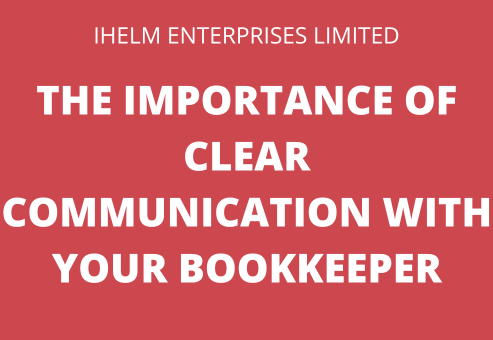During March’s Facebook Live, I discussed the importance of clear and regular communication with your bookkeeper.
In the fast-paced world of business, financial clarity is essential for success. One of the most critical relationships a business owner has is with their bookkeeper. In the UK, where businesses must comply with HMRC regulations, VAT requirements, and payroll obligations, having open and transparent communication with your bookkeeper is more important than ever. Here’s why maintaining clear communication with your bookkeeper is crucial to your business’s financial health and success.
1. Ensuring Compliance with UK Regulations
HMRC regulations are constantly evolving, and businesses must stay compliant with tax laws, Making Tax Digital (MTD) requirements, and payroll regulations. A bookkeeper’s role is to ensure that all financial records are up-to-date and compliant with UK laws. However, without regular communication, they may not have the necessary information to file accurate returns, which could lead to penalties or legal issues. Keeping your bookkeeper informed about changes in your business operations ensures they can make the necessary adjustments in your accounts.
2. Accurate Financial Reporting
Timely and accurate financial reports are crucial for making informed business decisions. If a client fails to provide receipts, invoices, or transaction details promptly, the bookkeeper may struggle to reconcile accounts properly. Regular updates and a clear system for sharing financial documents ensure that reports reflect the true financial position of the business, helping owners make sound financial choices.
3. Efficient Cash Flow Management
Cash flow is the lifeblood of any business, and mismanaging it can lead to financial instability. A bookkeeper can help forecast cash flow trends and identify potential shortfalls, but only if they have access to accurate and up-to-date information. Keeping your bookkeeper informed about upcoming expenses, new revenue streams, or financial challenges allows them to provide better advice and support to keep your business on track.
4. Avoiding Costly Mistakes
Miscommunication or a lack of communication can lead to costly mistakes, such as missed tax deadlines, incorrect VAT submissions, or payroll errors. These mistakes can result in financial penalties and added stress for business owners. By maintaining an open line of communication with your bookkeeper, you can avoid these pitfalls and ensure your financial records are always in good order.
5. Streamlining Business Growth
A well-informed bookkeeper can provide valuable insights into business performance and financial trends, helping clients plan for growth. Whether you’re looking to secure financing, expand operations, or hire new staff, your bookkeeper can guide you on the financial feasibility of your plans. However, they can only do this effectively if they are kept up to date with your business goals and strategies.
6. Building a Trustworthy Partnership
Trust is key in any business relationship, and the one between a client and their bookkeeper is no exception. Open and honest communication fosters trust, ensuring that both parties are working towards the same financial goals. A bookkeeper who understands your business inside and out can become a valuable asset, offering strategic financial advice rather than just handling compliance tasks.
How to Improve Communication with Your Bookkeeper
To maximise the benefits of your relationship with your bookkeeper, consider implementing the following practices:
- Schedule regular check-ins: Monthly or quarterly meetings can help keep financial matters on track.
- Use cloud-based accounting software: Platforms like QuickBooks, Xero, and Sage make it easier to share financial data in real-time.
- Be proactive with document sharing: Provide invoices, receipts, and bank statements promptly.
- Discuss business changes promptly: Inform your bookkeeper of any major business changes, such as new contracts, loans, or investments.
Maintaining clear and open communication with your bookkeeper is not just a good practice—it’s a necessity – to ensure that you are meeting all of your legal obligations. By working closely together, businesses can ensure compliance, maintain accurate financial records, and make informed decisions that support growth and stability. Strengthening this relationship can ultimately lead to a more successful and financially secure business.
If you have any questions about how you can ensure you are communicating clearly and regularly with your bookkeeper, please feel free to e-mail me.

